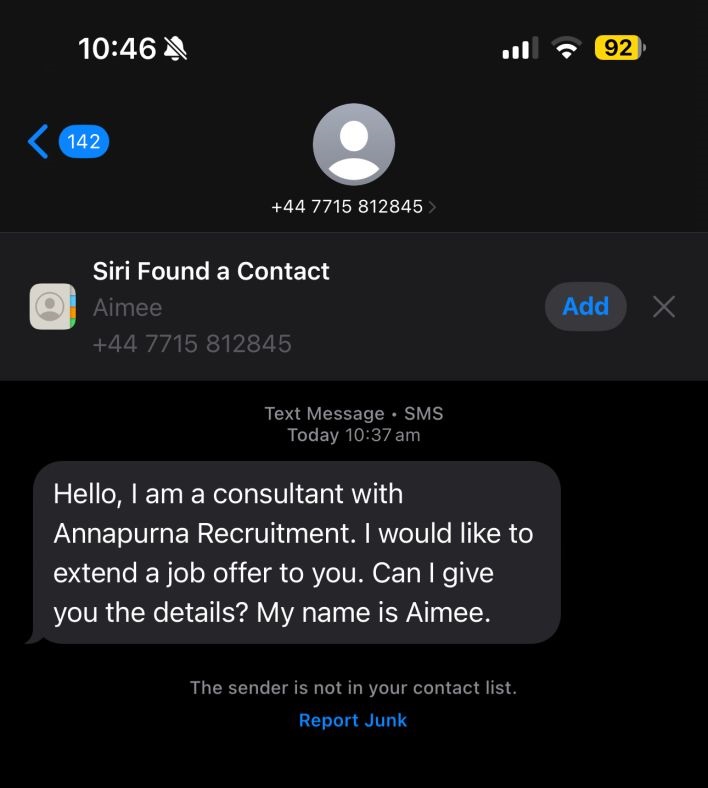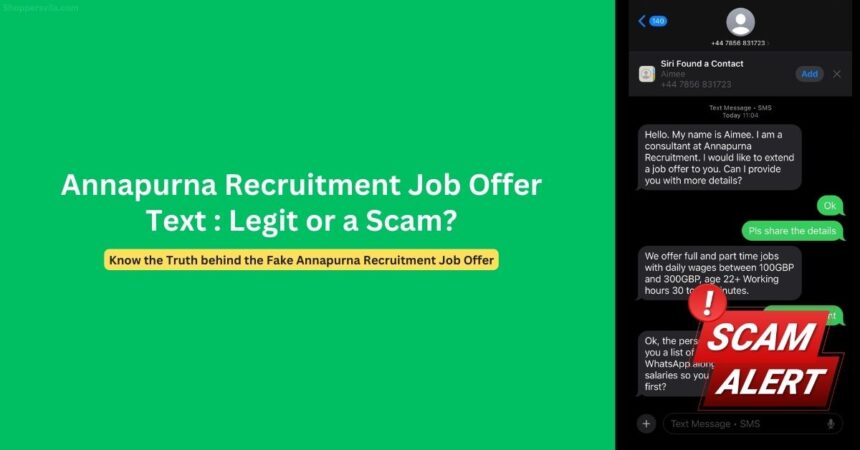In recent months, a sophisticated wave of recruitment scams has swept across the UK, with fraudsters impersonating reputable recruitment agencies to steal personal information and money from job seekers. The latest high-profile victim is Annapurna Recruitment, whose founder and CEO, Nigel Fox, recently issued a public warning about scammers using his company’s name to target unsuspecting candidates.
Overview of Annapurna Recruitment Impersonation Scam Text
Victims report receiving text messages from someone claiming to be “Aimee,” a consultant at Annapurna Recruitment. The initial message is brief and professional-sounding:

Hello, I am a consultant with Annapurna Recruitment. I would like to extend a job offer to you. Can I give you the details? My name is Aimee.
When recipients respond, the scammer offers suspiciously lucrative terms—daily wages between £100 and £300 for just 30-60 minutes of work, with the only requirement being that applicants are aged 22 or older. The conversation then quickly shifts to WhatsApp, where “the person in charge” will supposedly provide a list of available positions.
“This happened to us today (and a couple of years back), and is seemingly fairly commonplace these days,” Fox wrote in his LinkedIn post. “If you get a text message from a recruiter that looks like this, it’s probably not legit.”
According to Fox, the slightly too formal language, lack of specific details, and completely cold outreach are telltale signs of the scam. He emphasized that Annapurna Recruitment never charges candidates for services, suggesting that scammers might eventually request payment for CV formatting or similar services.
Not an Isolated Incident: The Growing Trend
The Annapurna case is far from unique. In recent months, numerous recruitment agencies have reported similar impersonation scams:
- 2i Recruit in Surrey received calls from 25 victims who had been asked to share personal details with scammers posing as company representatives
- Nolan Recruitment in Cheshire reported scammers using their company name for nearly 18 months
- HR Heads in Southampton was targeted for about six months, with scammers using a former employee’s name
- Even major professional services firms like Deloitte have issued warnings about similar scams
These impersonation scams represent a growing trend in recruitment fraud. According to a Home Office spokesperson, there were an estimated 3.2 million fraud offenses in the year ending September 2023—and while this represents a 13% decrease from the previous year, recruitment scams specifically appear to be on the rise.
Patterns and Tactics: How the Scammers Operate
Across different impersonation cases, the scammers follow remarkably similar patterns:
Initial Contact Methods
- Unsolicited text messages or WhatsApp messages
- Fake job postings on legitimate job boards
- Social media outreach claiming to represent recruitment firms
Progression of the Scam
- Initial contact offering lucrative, often unrealistic job opportunities
- Request for personal information for “verification purposes”
- Attempt to move communication to WhatsApp or other platforms
- Introduction of a “senior colleague” or “person in charge”
- Eventual request for payment or sensitive personal data
One victim, 18-year-old Bella Betterton, told Radio 4’s Money Box that she had nearly £3,000 stolen after being targeted. She was contacted via WhatsApp messages and phone calls, believing she had participated in a legitimate job interview before the fraudsters tricked her into sharing her card details.
What Legitimate Recruiters ‘Annapurna Recruitment’ Are Saying
Recruitment agencies like Annapurna are taking these impersonation scams seriously, with many issuing public statements about their official practices.
Nigel Fox of Annapurna Recruitment stresses that candidates with concerns should either call their office directly or contact him personally to verify the legitimacy of any communication. In response to the scam, Annapurna has reportedly taken over their website’s chatbot to respond manually to the more than 75 inquiries they received about the fraudulent messages.
Similarly, Deloitte has clarified that they only communicate job offers through official email addresses ending in @deloitte.co.uk and never request payments during the recruitment process. They also explicitly state that they don’t use WhatsApp for candidate communications.
The Recruitment and Employment Confederation (REC), which represents the recruitment industry, emphasizes that its members would never ask job seekers for payment to find them work, as this practice is illegal in the UK.
Red Flags: How to Spot a Recruitment Scam
Based on warnings from Annapurna, Deloitte, and other targeted companies, here are the key warning signs that a job offer might be fraudulent:
1. Too Good to Be True Offers
- Extremely high pay for minimal work
- No experience or qualifications required
- Guaranteed employment without proper interviews
2. Communication Issues
- Messages from personal rather than business email addresses
- Poor grammar and spelling errors
- Inconsistent branding or unprofessional documents
- Communication shifting quickly to WhatsApp or other messaging platforms
3. Unusual Requests
- Requests for payment for background checks, training, or work supplies
- Early requests for sensitive personal information (passport details, bank information)
- Pressure to make quick decisions
- Offers to sell company merchandise, phones, or laptops
4. Verification Problems
- Contact information that doesn’t match the company’s official details
- Inability to find the job posting on the company’s official website
- No physical address or unreachable phone numbers
Protecting Yourself: Steps Every Job Seeker Should Take
To guard against recruitment scams, experts recommend the following precautions:
Verify Before Engaging
- Research the company and the recruitment consultant thoroughly
- Check that email addresses match the company’s official domain
- Look up the phone number independently rather than calling back on the provided number
- Visit the company’s official website to verify job openings
Protect Your Personal Information
- Never share sensitive personal information until you’ve confirmed the legitimacy of the opportunity
- Be particularly cautious with passport details, bank information, and national insurance numbers
- Don’t pay any fees upfront for job opportunities
Report Suspicious Activity
- If you suspect a scam, report it to Action Fraud (in the UK) by texting the message to 7726 (spells “SCAM” on the keypad)
- Report job scams specifically to Jobsaware at jobsaware.co.uk/report/scam
- Contact the company being impersonated through their official channels
Trust Your Instincts
As Sara Burton, a commentator on Fox’s LinkedIn post, advised: “If something doesn’t feel right, it probably isn’t. Listen to your gut feeling.”
The Broader Impact: Beyond Individual Victims
The impact of these scams extends beyond the immediate victims. For legitimate recruitment companies like Annapurna, the damage to reputation can be significant.
“People have been leaving really negative reviews, which is damaging our reputation,” said Sean Neary, whose company Nolan Recruitment has been impersonated by scammers. “I feel for the people it’s been happening to. There’s nothing we can do apart from raise awareness.”
In some extreme cases, victims have quit existing jobs after receiving what they believed were legitimate offers, only to discover the fraud too late. Mike Andrews, national coordinator for the National Trading Standards eCrime team, described scenarios where victims “have handed in their notice and left their job, and they turn up at their new place of work, only to be turned away because no such business exists.”
Looking Ahead: The Fight Against Recruitment Fraud
Government and industry are taking steps to combat the rise in recruitment scams. The Home Office has launched a national fraud squad and rolled out enhanced support for victims across England and Wales. Meanwhile, job platforms like Indeed.com claim to remove “tens of millions” of suspicious job listings monthly.
For their part, recruitment agencies are increasingly educating both their staff and candidates about the risks and warning signs. Many, like Annapurna, are implementing verification processes to help candidates distinguish between legitimate communications and scam attempts.
As the job market continues to evolve, particularly with the growth of remote work making in-person verification more challenging, both companies and job seekers will need to remain vigilant against increasingly sophisticated impersonation scams.
Remember: legitimate recruiters will never ask for payment to find you work, and they will follow professional processes for verification and onboarding. By staying informed and cautious, job seekers can protect themselves from falling victim to these increasingly common scams.
































